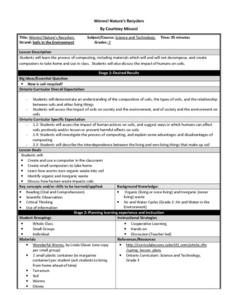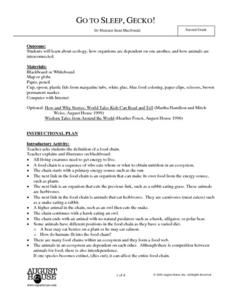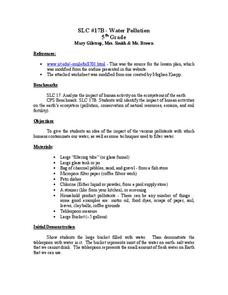Curated OER
Fieldwork: Horizons Under Ground: Digging Through Wetland Soil
Learners study the different soil types and describe the different soils in various environments. In this soil lesson students walk to a reserve and discuss what they saw.
Curated OER
Dissolved Oxygen and Photosynthesis: 1
Students are taught that plants produce oxygen underwater, and they design an experiment that test this question. They discuss whether plants give off oxygen, and how to measure this. Students measure the increase in dissolved oxygen...
Curated OER
Stream
Students examine stream waters. In this scientific inquiry lesson, students "explore" wetlands as they participate in a demonstration that reveals information about steam waters and insects.
NOAA
Vertebrates I
I spy a spine. The 19th installment of a 23-part NOAA Enrichment in Marine sciences and Oceanography (NEMO) program explores vertebrate species, such as sharks and other fish. Learners take part in an activity evaluating the...
Curated OER
Acid Rain
Create a simulation of acid rain in your classroom with lemon juice and bean plants to help kids study the effects of pollution on plants. In addition, learners will listen to a story and write responses based on guiding questions.
Curated OER
Spinning the Eco Web
Students examine the components and relationships of ecoregions and ecosystem management. They define ecoregion and ecosystem, list ecoregions, and participate in a simulation that demonstrates the connections between parts of the...
Curated OER
Photosynthesis and Respiration
Pupils comprehend the relationship between plants and animals in an aquatic ecosystem. They predict the effects of low dissolved oxygen on the organisms. Students create microcosms with plants, animals, or both. They determine which...
Curated OER
Worms, Nature's Recyclers!
Students study what worms need to survive in different environments. They study how worm composting improves soil and reduce waste. They discuss composting techniques and present a puppet show about a worm's life.
Curated OER
Marshland Wonders
Students review the characteristics of wetlands and list their benefits. After viewing short videos, they identify the organims that make their home in wetlands and how they have adapted. They compare and contrast the characteristics...
Alabama Learning Exchange
Nature's Life Cycle
Become a member of the Pollution Patrol and stand up to litter! After discussing the life cycle of seeds and discussing how plants figure into the food chain, young conservationists engage in several activities involving podcasts,...
August House
Go to Sleep, Gecko!
A cute folktale from Bali tells the story of Gecko, Elephant, and Buffalo, and Gecko's struggle to sleep. After reading Go to Sleep, Gecko, learners focus on comprehension questions, singing and learning about geckos, building a house...
Curated OER
Insects: Bug Off
Students design and conduct an experiment to test three organic pesticides to control ants. They view a video that demonstrates ant behavior and the role of pesticides in insect control. In small groups, they set up behavior...
Curated OER
Lakes and Ponds
Students describe and recognize the difference between a lake and a pond. They name six ways in which a lake or pond can be formed. They describe the importance and act of evaporation on a waterway.
Curated OER
Dinosaurs 1: Where Are the Dinosaurs?
Students explore the time of the dinosaurs. In this extinction lesson, students watch a video clip about different dinosaurs and are asked about what they observed. Students talk about how dinosaurs hatched from eggs and compare that...
Curated OER
Groundwater as Part of the Water Cycle
Ninth graders study the effects of soil and rocks on filtering groundwater. In this groundwater lesson students complete a lab activity that includes sources of contamination.
Curated OER
Water Quality
Learners conduct experiments to study the quality of water. They examine how pollutants get into and affect the water supply in this unit.
Curated OER
Does the increased use of fertilizers effect biodiversity?
Students conduct a hands-on lab activity in which they analyze a sample of water from a local stream or pond. They introduce a fertilizer solution into the sample and analyze and describe their findings.
Curated OER
Water Quality Tests Explained
Students define all eight water quality parameters and list at list one source for each of the eight water quality parameters. They determine how each of the eight parameters affect river ecosystems.
Curated OER
"Habitats"
Students complete a unit of lessons on animals and animal conservation. They observe a square meter of ground outside the school, set up a model environment, analyze an owl pellet, grow bread mold, and explore various websites.
Curated OER
Great Salt Lake
Fourth graders make an ecosystem that brine shrimp can live in and take data as to what level of salinity the water is, how cold it is, and other data that students may think is important. They also hypothesize and predict the outcomes...
Curated OER
Ecology and the Conservation of Natural Resources
Learners examine the components of ecosystems. They compare and contrast an ecosystem to an aquatic ecosystem. They examine a local ecosystem and discuss its components.
Curated OER
Beaver Ecology
Students explore the lives of bgeahvers. They identify the physical and behavioral adaptations that help beavers survive in their environment. Students compare and contrast how beavers influence the ecology of both forest and aquatic...
Curated OER
All About Ants
Students create model ants in order to study the characteristics of insects such as body segments, number of legs, and feelers, as well as how these characteristics serve the insect.
Curated OER
Water Pollution
Fifth graders investigate how humans pollute the water supply with a number of different contaminates. While working in small groups they examine screening, sedimentation, filtration, and chemical treatments as methods of water treatment.

























